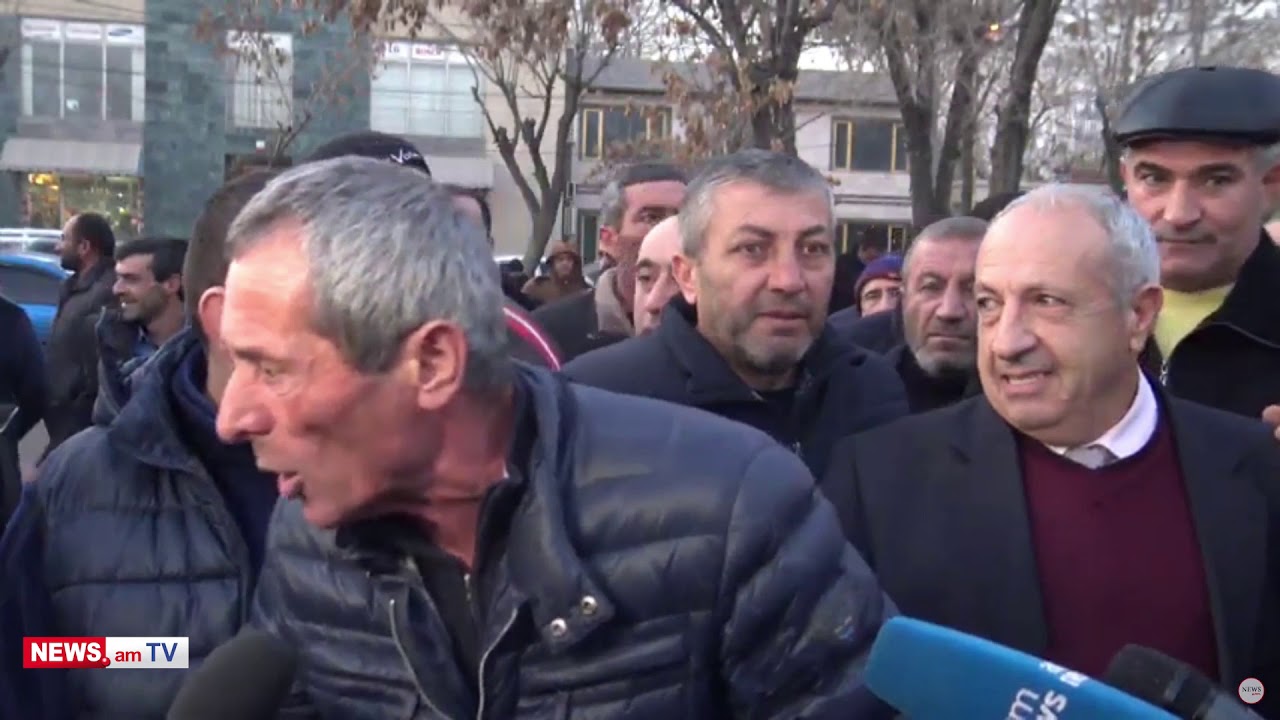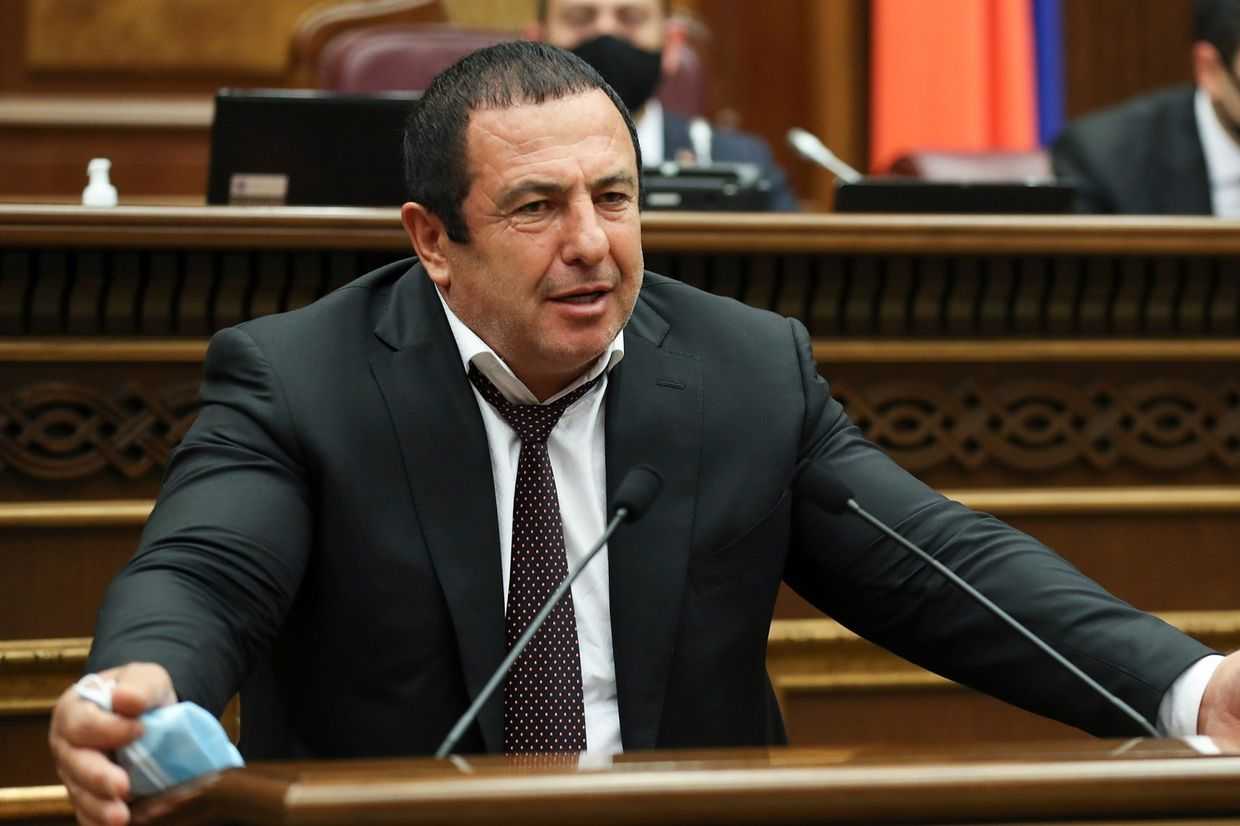

Livestock farmers and meat vendors have begun protesting the enforcement of rules obligating all meat sellers and livestock producers to slaughter their meat only in approved slaughterhouses.
Protests in the capital Yerevan culminated on 20 January when a large group of protesters picketing in front of the Government building during a scheduled session of Government blocked off one of the streets leading to the city’s central Republic Square.
The protests came after on 15 January, the Government’s Food Safety Inspectorate (FSI) launched inspections of all meat selling stores and supermarkets across Yerevan. The rules around slaughtering animals were introduced by the government in July 2018 but were not immediately enforced.
Speaking to 1TV in a live video from one of the inspections, Artur Shatvoryan, advisor to the head of the FSI, explained that the decision was never properly implemented due to a lack of designated slaughterhouses.
‘Six months ago, our agency made it clear that starting from January 2020, inspections would take place and the decision would come into full force.’
‘Special working groups have been created to help establish more slaughterhouses, train personnel, etc.’, he added.
The rules mean that all meat vendors and supermarkets must purchase meat with an accompanying document asserting that the meat was butchered in a licensed slaughterhouse.
The document includes a barcode with information including the owner of the animal, where the meat came from, which slaughterhouse it was slaughtered in, the day it was slaughtered, and expiration dates. Consumers can scan the barcode before purchasing to see where the meat comes from.
Shatvoryan said that his agency had conducted meetings with provincial governors and community leaders in order for them to communicate the process to farmers and butchers in their communities.
On 16 January, the FSI signed contracts with almost 30 slaughterhouses establishing the maximum price for the slaughter of animals. The maximum price for the slaughter of large animals was set at ֏10,000 ($21), small cows at ֏ 3,500 ($7.30) and pigs at ֏ 5,000 ($10).
The contracts also state that transportation for livestock to slaughterhouses will be free for farmers if they are no further than 30 kilometres from the slaughterhouse and are transporting more than three animals. If not, they will be charged ֏3,000 ($6.30) per animal.
‘Where’s your conscience?’
Many livestock farmers and butchers have remained unhappy with the decision. During the protest on 20 January, protesters told reporters that transporting animals was a difficult task.
‘I can barely take my cow out to slaughter in my own yard, how am I supposed to get them on a vehicle and move them?’ one asked.
Others said they were not against transporting their livestock but that there were currently not enough slaughterhouses.
‘How is a poor villager supposed to drive 90 kilometres with two pigs to reach [the nearest] slaughterhouse?’ one asked. ‘Where’s your conscience?’
In an interview with Azatutyun on 18 January, Shatvoryan said that the majority of the protestors weren’t actually farmers but meat suppliers, who slaughtered animals to sell the meat to vendors and butchers.
‘Our inspectors know these middlemen’, said Shatvoryan. ‘They are working for meat vendors who with the [new documents] won’t be able to sell meat from sick or dead livestock. They will also be forced to pay taxes, thus, losing their former profit.’
In an interview with state-run news agency Armenpress, Anush Harutyunyan, head of the Information and Public Relations Department at the FSI, said that strict inspections were already taking place and many large supermarkets and restaurants had already switched to using meat from the official slaughterhouses.
Following the 2o January protest in Yerevan, a number of demonstrators continued their protests the following day in their hometowns, closing major streets.
Several small protests were held on 21 January in Tavush, Armavir, and Ararat provinces. During a protest near the village of Mkhchyan, the Governor of Ararat, Garik Sargsyan, met with protest leaders.
In a post on Facebook, Sargsyan said that the government was prepared to listen to its citizens but insisted that ‘closing streets is not a reasonable way to solve issues’.
During the meeting, Sargsyan told protestors that there would be compromises and that parliament had assured him that there will be meaningful solutions to this issue.
On 20 January, the Office of the Human Rights Defender announced that they were looking into complaints against the decision, specifically the financial toll for farmers of transporting livestock to slaughterhouses.
The government responds
The government has staunchly defended the changes and has also questioned where opposition to the decision was coming from.
In an interview with OC Media, Deputy Minister of Agriculture Tigran Gabrielyan claimed that 70% of the protestors were middlemen who work for market meat vendors. He said the remaining protestors were farmers who were being misled by these middlemen.
‘Previously, these middlemen would go and slaughter the animals in courtyards, weigh the meat, and charge the farmer, most of the time lying about the weight and charging extra’, Gabrielyan said.
‘They would also take the byproducts of the slaughter that cost a lot of money in the market and were, thus, harming the economy.’
Gabrielyan also said the government was establishing mobile slaughterhouses that would be run by existing and future slaughterhouses to alleviate the transportation costs in villages far from any slaughterhouse.
‘We have also proposed slaughterhouses establish certain days within the week where they will accept livestock for slaughter so that farmers know when to organise the transportation of their animals’, explained Gabrielyan.
‘We are also going to provide ֏3 million-֏15 million ($3,500-$30,000) loans with a five per cent interest rate for establishing new [static] slaughterhouses’, he said.
Gabrielyan also said the changes would provide a boost to the economy. ‘Byproducts are worth a lot. Many are used in sausage and deli meat making’, he stated. ‘This can help local sausage and deli meat producers obtain sanitary affordable ingredients, as well as boost export of byproducts.’
The FSI has also remained adamant in their decision. On 21 January they posted photos of unhygienically stored meat claiming that it will do everything in its power to prevent the conditions shown in the pictures.
The FSI said they had received many inquiries and applications about establishing new slaughterhouses around the country.
In a separate lengthy post, the FSI’s Anush Harutyunyan insisted the problem was being addressed.
‘As of 21 January, there are already 38 working slaughterhouses. Six days ago on 15 January, there were only 22’, she wrote. ‘Tomorrow there will be more. Twenty more slaughterhouses are under construction and 27 are in the pre-design stage.’
‘Yesterday, we talked to a representative of the Yezidi community. We were able to convince him and now he’s thinking about creating a slaughterhouse in his own community.’
She went on to say that in two months time there would be no village further than 30 kilometres from a slaughterhouse, meaning all livestock would be transported for free.
‘With the rise in the number of slaughterhouses, the price will fall: it’s the law of markets’, Harutyunyan stated.
During a Q&A session in parliament on 22 January, Pashinyan was questioned about the regulations. He reaffirmed that regulating the slaughter of livestock has to be mandatory. ‘It’s not only about health issues, but the rating of our country as well’, he said. ‘However, do our protesting compatriots have just evidence to oppose it? Yes. And the most important evidence in this case is that the density in terms of location and number of slaughterhouses are not enough.’
Pashinyan announced that until 6 February, the Government would consider providing subsidised loans to support the establishment of new slaughterhouses.
‘The regulation won’t come into force until 1 July of this year except in supermarkets and restaurants in Yerevan’, Pashinyan claimed. ‘After 2 July, however, under no circumstances are we going to discuss this issue again.’







